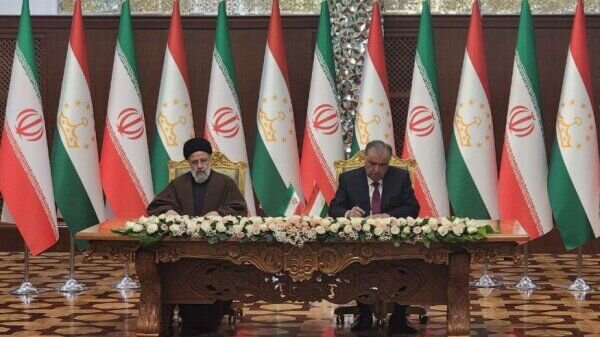Iran president visits Tajikistan, pushes for stronger relations

TEHRAN- Iranian President Ebrahim Raisi arrived in the capital of Tajikistan on Wednesday in a visit aiming to further strengthen relations between Tehran and Dushanbe.
The Iranian president and the accompanying delegation held meetings with their Tajik counterparts and signed a number of cooperation documents with the aim of further boosting relations between the two countries.
Gaza issue will dominate 16th ECO summit
Prior to departing for Tajikistan on Wednesday, the Iranian president said that the heads of state at the meeting of the Economic Cooperation Organization (ECO) will discuss the Gaza issue.
Prior to his departure to Tajikistan, President Raisi outlined the importance of relations with the countries in the region.
He pointed to the significant capacities of the countries in Central Asia, saying that strengthening ties with these countries is on the agenda of Iran’s foreign policy.
He reiterated that the previous visit to Tajikistan resulted in tackling some issues between the two countries.
“The visit to Tajikistan is aimed at strengthening political, economic, and cultural ties,” added Raisi.
Raisi will leave Dushanbe for Tashkent upon the official invitation of Uzbek President Shaukat Mirzayev to attend the 16th Economic Cooperation Organization (ECO) Summit, which will be held on 8-9 November.
“The economic ties between ECO members will be the main topic of discussion,” Raisi said.
Describing Palestine as “the most important issue,” President Raisi stressed that the issue of Gaza will be the most crucial subject of discussion in Uzbekistan.
Raisi pointed out that people are dissatisfied with international organizations' handling of the Gaza issue.
He criticized the international organizations' mechanism for not representing the voice of the oppressed.
President Raisi arrives in Dushanbe
Upon the official invitation of Tajik President Emomali Rahmon, President Raisi landed in Dushanbe International Airport for a one-day visit on Wednesday afternoon.
He was welcomed by Mohammad Taher Zakerzadeh, Speaker of the House of Representatives for Tajikistan, and Daler Juma, Tajik Minister of Energy.
The President of Tajikistan warmly received his Iranian counterpart at the Palace of Nations in the afternoon.
In the joint presser with his Tajik counterpart, Raisi said “Iranian nation has decided to turn sanctions into an opportunity.”
Raisi expressed his satisfaction with visiting the friendly and brotherly country and stated, "Without a doubt, the exchanges between the two friendly countries can contribute to the development of bilateral relations."
Referring to the decisions taken during his previous visit to Dushanbe, the president added, "Today, after months have passed, we have seen that the relations between the two sides have developed well in the political, economic, commercial, and cultural fields."
He stated that despite the imposed sanctions, Iran has made lots of progress, namely in science and technology.
The head of the Iranian government enlisted Iran’s capacities in energy, agriculture, industry, and mines, voicing the country’s readiness to share experiences with the Tajik nation.
Stating that Iran has made great progress despite the threats and sanctions, the president said, "Iran has made great progress in the field of science and technology, and we have significant capacities in the fields of energy, agriculture, industry, mines, and technical experiences that we can share with the dear people of Tajikistan."
Referring to the long record between Iran and Tajikistan, Raisi urged more steps to be taken in the field of culture.
Pointing out that we have a lot in common with Tajikistan in the cultural field and many areas of cooperation, the president said, "It was decided that with the activation of the relevant departments in the two countries, we can take steps towards the development of the Persian language in line with cultural development and countering the cultural invasion so that we will be able to protect our cultural assets, which are the important and lasting capital of Iran and Tajikistan."
He noted that culture is a “lasting reservoir,” which can protect society in case of cultural invasion.
Raisi added, "There are good capacities between the two countries in the commercial and economic field, which can be revived with the seriousness, follow-up, and determination that exists between the two countries today."
He also emphasized that the two countries have common views on regional issues and stated, "Both countries are concerned about the dear people of Afghanistan and we believe that the Americans, after 2 decades of occupying this country, have left nothing but destruction, murder, killing and backwardness for Afghanistan. It is the right of the people of Afghanistan to grow and develop –very good people who we believe have a very bright future ahead of them."
He described the Palestine issue as a matter of humanity that cannot be ignored.
The Iranian president reiterated that people worldwide urge an “immediate ceasefire,” adding that Iran calls for a halt to Israel’s war crimes and the genocide that is being carried out in the Gaza Strip.
Tehran, Dushanbe ink 18 cooperation documents
In the Tajik capital, the high-level officials of Iran and Tajikistan signed a number of documents in many areas of cooperation.
The documents and MOUs were signed in the presence of the presidents and the delegations from both sides.
Trade, economy, fighting drug trafficking, transportation, culture, art, shared free zones, education, and technology were among the most important documents that were inked.
The documents were signed between the ministers accompanying the Iranian president and their Tajik counterparts.
Leave a Comment